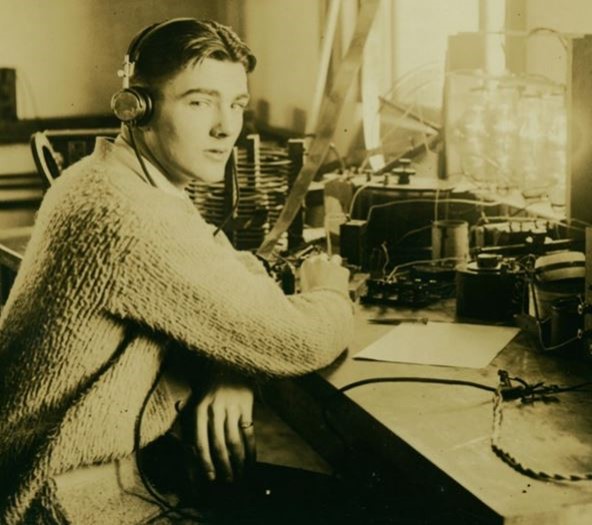The eldest of 31st President Herbert Hoover’s two sons, Herbert Charles Hoover, W6ZH, better known as Herbert Hoover Jr., shared more than just a common name with his highly influential father.
Both father and son were bonified techies, graduating from Stanford University with engineering degrees—the President’s in mining engineering and his son’s in general engineering. The younger Hoover later earned a Master of Business Administration degree with distinction from Harvard Business School.

The President carried the enthusiasm he shared with his son into his presidency, as well. He was the first to broadcast on TV (1927), air a campaign speech on radio, keep a telephone at his White House desk, and use a teleprompter on national TV (1952). W6ZH, likewise, followed his passions, earning amateur radio licensure plus a few “presidencies” of his own, including heading up the American Radio Relay League (1962), the IARU, and a slew of prestigious appointments in the business sector as well as several legislative ones.
W6ZH’s love of all things amateur radio had an early start. He gained an interest in the hobby at 14 years old. He was supplied with an impressive array of amateur radio equipment by his highly supportive dad. Plus, he didn’t let minor obstacles stop him. After discovering that his hearing impairment—a result of an earlier case of influenza—made the activity more difficult, he circumvented the issue by singlehandedly building a hearing aid for himself. And that was only the beginning of a long list of accomplishments. After earning his MBA, he was awarded a fellowship from the Daniel Guggenheim Fund to pursue the study of aviation economics—specifically the economics of radio in aviation.
He joined Western Air Express, which would later become a part of American Airlines, in 1928, setting up its communication system. As communications chief, he spent the next year and a half installing a network of stations across the western U.S. to guide radio-equipped aircraft along 15,000 miles of airways. Originally, one of the aims of the company was to make it possible for passengers on every flight to contact those on the ground mid-flight. W6ZH also managed a staff of 75 engineers, overseeing the purchase of $200,000 of radio equipment (ignore us as we turn green with envy)!
In 1929, Western Air Express along with Boeing and American Airways formed the nonprofit corporation Aeronautical Radio Inc., making it the airline industry’s only licensee and coordinator of radio communication outside of the government. Hoover also served as president here and, as a result, was selected to appear on the cover of Time magazine on July 14, 1930.
But it was also in 1930 that he left Western Air Express amidst circulating election rumors that the company had unfairly won certain government contracts due to his father’s political status. And so he resigned. Soon after, he was diagnosed with tuberculosis. After a short stint dedicated to his recovery, some additional pursuits as a professor of aeronautical engineering, and the joint purchase of the Herbert Hoover Birthplace with his brother, W6ZH got involved with exploration geophysics, or using radio to prospect for oil. He founded United Geophysical, hired 200 employees, and started research and work in five labs to perfect the use of seismology in this pursuit. The company was later bought out by Union Oil, but W6ZH stayed on as president.
He would go on to broker oil deals with President Eisenhower during times of international crises and serve as Eisenhower’s under-secretary of state. He also often stood in as the acting secretary of state for John Foster Dulles. Herbert Hoover, Jr., W6ZH, passed away on July 9, 1969, at just 69 years of age following a stroke, leaving behind a legacy of important contributions to the field of radio.

